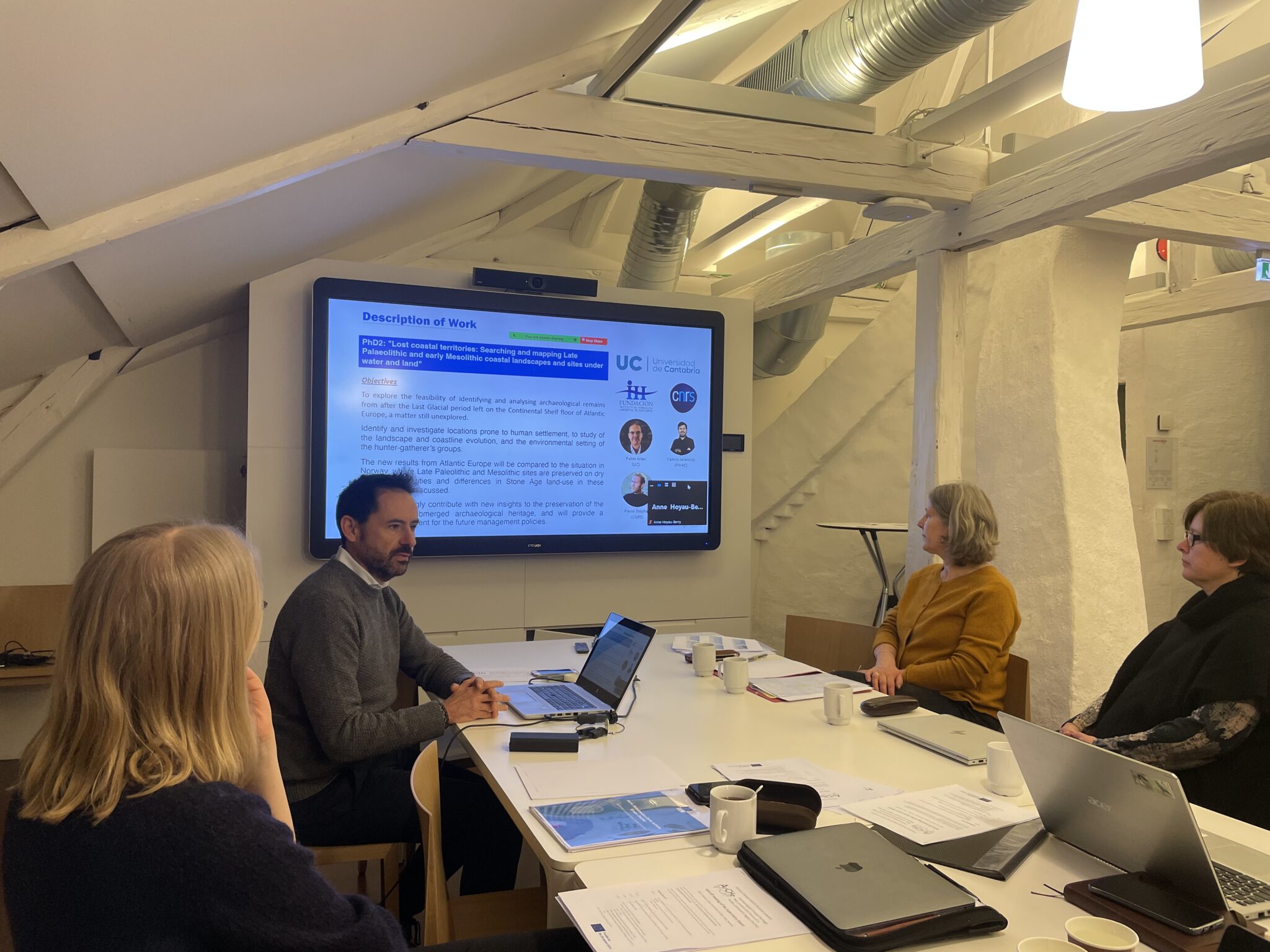IHCantabria participated in the presentation and kick-off meeting of the European ArCHe project in Norway

Intervention of Javier López Lara, head of the Climate Risk, Adaptation and Resilience Group of IHCantabria, at the kick-off Meeting of the ArCHe project, held in Oslo, Norway
ArCHe is a multidisciplinary project in which the humanities, life sciences, earth sciences and social sciences will converge to address Europe’s vulnerable coastal archaeological heritage
The Environmental Hydraulics Institute of the University of Cantabria (IHCantabria) has officially launched the European project ArCHe, following the successful presentation meeting of this project that took place in Oslo, Norway, on January 30-31, 2024. It aims to achieve a holistic understanding of Stone Age finds and sites in coastal landscapes across Europe to ensure their sustainable future. Funding for this project comes from the Doctoral Network of the Horizon Europe Program, through the Marie Skłodowska-Curie Actions (MSCA), which will finance the work of 10 PhD students until the end of 2027, which is when the ArCHe project will end.
The name ArCHe stands for the full title of the project, which is: “Archaeological Coastal Heritage: Past, present and future of a hidden prehistoric legacy“. This European project will be focused on enabling these 10 PhD students to contribute with their studies to enhance the scientific and public value of Europe’s coastal archaeological heritage, focusing specifically on the legacy of hunter-fisher-gatherers of the Paleolithic period. This valuable heritage, which offers insights into human interaction with the coast, is facing significant environmental and human threats in various geographical settings in Europe.
Archaeological remains of Stone Age (c. 12,000-2,000 calBC) hunters, fishermen and gatherers in coastal areas throughout Europe are fractured, highly vulnerable, have low visibility and lack dissemination. In response to these challenges, the European ArCHe project offers to train young researchers as qualified international ambassadors to contribute to the research, management and communication of this legacy in different sectors. To this end, this project will promote the development of doctoral research from multidisciplinary approaches, including contributions from the humanities, life sciences, earth sciences and social sciences, to develop best practices for analyzing the vulnerability of archaeological heritage located on the coasts of Europe.
The ArCHe project presentation meeting was organized by the University of Oslo and was held in the Norwegian capital on January 30 and 31. This meeting was attended by representatives of the six beneficiary institutions of the project, which are: the University of Oslo, FIHAC/IHCantabria, the Universidad de Cantabria (UC), Centre National de la Recherche Scientifique (CNRS), the University of Gothenburg and the University of Latvia. Representatives from the following project partners, including academic research centers and non-academic organizations such as cultural heritage sectors, specialized organizations, museums and media, also participated: Geological Survey of Norway (NGU), National Museum of Underwater Archaeology (ARQVA), Sia Skuba Films, University of Salamanca, Simrishamns kommun, University of Tallinn, ADRAMAR, University of Rennes and Viken Fylkeskommune.
The meeting in Oslo was attended by key figures, including project coordinator Almut Schülke and project manager Marie Amundsen (both from the University of Oslo). Pablo Arias Cabal, professor of Prehistory, represented the University of Cantabria. The following people participated on behalf of FIHAC/IHCantabria Javier López Lara -professor at the University of Cantabria and head of the Climate Risks, Adaptation and Resilience Group of IHCantabria, and Silvia Fernández Rodicio, representative of the European Projects Department of this institution, participated on behalf of FIHAC/IHCantabria. The Centre National de la Recherche Scientifique (CNRS) was represented by Catherine Dupont, the University of Gothenburg by Anna Bohlin, and the University of Latvia by Valdis Bērziņš.
The objectives of this meeting included the official launch of the ArCHe project, the presentation of the work packages (WPs), an update on the selection process of the 10 doctoral students, who will be supported by the HORIZON-MSCA ArCHe Doctoral Network, and discussions on administrative and financial aspects of this European project. These 10 doctoral researchers will play a crucial role in advancing the understanding and sustainable future of Europe’s Paleolithic coastal heritage.
The call for the selection of these 10 students remained open until February 4, so the name of the researcher who will be chosen by the HORIZON-MSCA ArCHe Doctoral Network to develop his doctoral thesis at IHCantabria’s facilities, as part of the European ArCHe project, will be known soon.
The HORIZON-MSCA ArCHe doctoral network seeks a holistic understanding of Paleolithic finds and sites in coastal landscapes across Europe. Fractured and vulnerable archaeological remains of Paleolithic hunter-fisher-gatherers will be studied from an international, interdisciplinary and intersectorial perspective. Its main objectives include investigating the use of coastal areas in the Paleolithic, working on the innovative past-present-future principle, applying transregional perspectives and developing new methods for sustainable heritage management.
For more information about ArCHe, you can visit the official website of this European project: https://www.arche.uio.no/.


